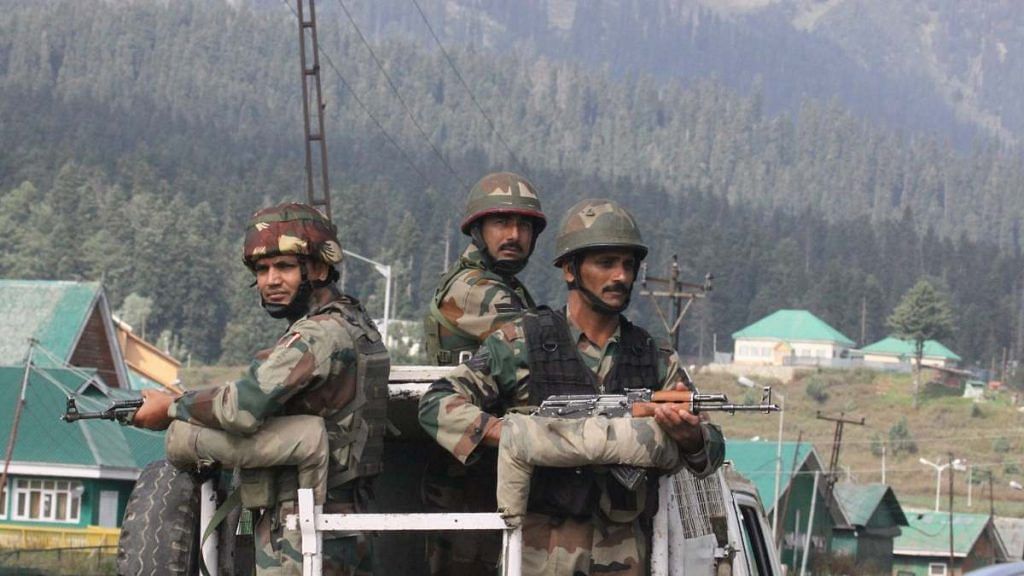The killing of five Indian Special Forces soldiers by Pakistan Army sponsored terrorists required an Indian military response. But not this. The effect of India’s retaliatory artillery strikes on Pakistan’s behavior is easy to predict: zero, zilch, nada. Though the drone footage of artillery shells falling on (presumably) Pakistani positions might impress India’s WhatsApp warriors, it is not going to change the Pakistan Army’s behavior even an iota.
This is easy to predict, partly because India has done this many times in the past, with no discernible effect. So there is no reason to expect the results this time to be any different. But mostly, it is an easy prediction because its logic appears to be the same as it always was: a publicity stunt to demonstrate that action was being taken rather than a calculated effort to deter future attacks.
Also read: Effect of surgical and Balakot strikes gone. Piecemeal policies against Pakistan won’t work
Pakistan won’t pause
Artillery attacks are the silliest form of military retaliation because Pakistan can easily reply in the same coin. Maybe Indian attacks will be more precise, or will kill more Pakistani soldiers, but these are marginal considerations for the Pakistan Army. The fact that India destroyed one more bunker than Pakistan did or that it managed to blow up a Pakistan ammunition dump will not even figure in Pakistan Army’s calculations, let alone alter that math. Don’t expect even a pause in the Pakistan Army’s effort to push terrorists into Kashmir.
Artillery and mortar duels across the LoC do not demonstrate Indian military’s superiority but rather a false military equivalence between the two sides. If Pakistan Army’s behavior is any guide, it actually breeds confidence that they can hold their own against India and that Pakistan is militarily as strong as India.
This is actually a lot worse than failing to deter Pakistan because it encourages the neighbour to continue its policy of supporting terror. The overriding impression – and hence the message – of India’s action is that it is unwilling or unable to escalate. This is disappointing because, in the last few years, India appeared to have overcome its traditional fear of escalation, as demonstrated by the surgical strike and the Balakot attack. What is in doubt now is India’s capacity to stay the course. Both those attacks broke the mould: the surgical strike because India openly claimed it, and the Balakot attack because India retaliated inside Pakistan’s territory for the first time.
Also read: Islamabad’s claim over Kabul gurdwara bomber ‘reeks of Pakistani conspiracy to save him’
India needs to continually penalise Pakistan
But occasional attacks like these will not suffice. New Delhi has to be prepared to militarily escalate each time Pakistan tests it. It should be prepared to escalate further if Pakistan responds to its escalation. Even in Balakot, India let Pakistan’s retaliatory attack go unanswered. Although there were some extenuating circumstances: one of India’s pilots had been shot down and was a prisoner and getting him back took precedence. Moreover, India had already undertaken a paradigm-breaking move. Both these factors provided a limited excuse for not escalating further.
New Delhi needs to address this key question: whether it is retaliating for show or effect? Until now, save the surgical strike and Balakot, India’s retaliation has been for show: to simply demonstrate that it was enraged. But it was an impotent rage, a flailing around that Pakistan could safely laugh it off while India suffered. It demonstrated more of India’s helplessness than its strength. Most unfortunately, it appeared to suggest that India’s conventional military superiority was useless in tackling Pakistan’s terror tactics.
The surgical strike and Balakot appeared to be the first step to suggest that India was moving towards retaliation for effect, to demonstrate to Pakistan that it could escalate in a manner that neighbour would not be able to match. Although none of the two attacks went as far as they should have, they at least ended the long-standing myth that any Indian escalation would lead to an uncontrolled action-reaction spiral, all the way to a nuclear exchange.
Also read: Many in J&K’s Sopore booked for lockdown violation as they attend Jaish militant’s funeral
Looking beyond Balakot
But these strikes needed to be followed up with further action to demonstrate that India has both the capacity and willingness to escalate. New Delhi should have used every serious terrorist attack as an excuse for escalation, and any military response from Pakistan as an excuse for further escalation.
The problem, of course, is that this requires discipline: it takes longer-term planning, careful preparation and calibrated action. Any Indian action would lead to a response. Indian reactions to all possible Pakistani responses need to be prepared prior to any action, even while fully realising that not everything can be predicted or controlled. But a dedicated deterrence strategy and disciplined preparation would give India a much better chance of dealing with the inevitable surprises that are bound to occur with any such enterprise.
Alternatively, India can flail around like a helpless giant, engaging in pointless artillery duels, because as sure as night follows day, we’ll be here again and again.
The author is a professor in International Politics at Jawaharlal Nehru University (JNU), New Delhi. Views are personal.
